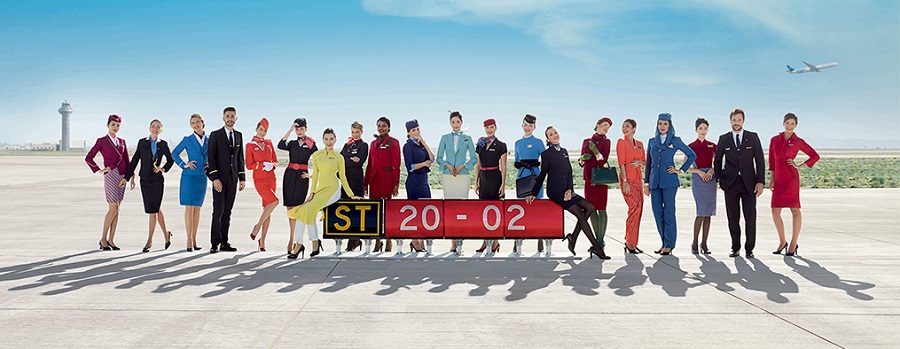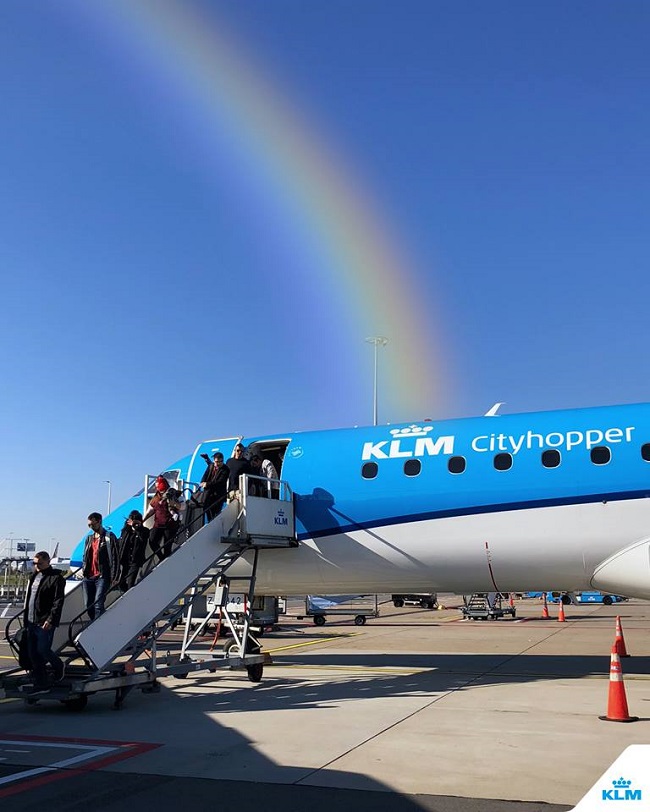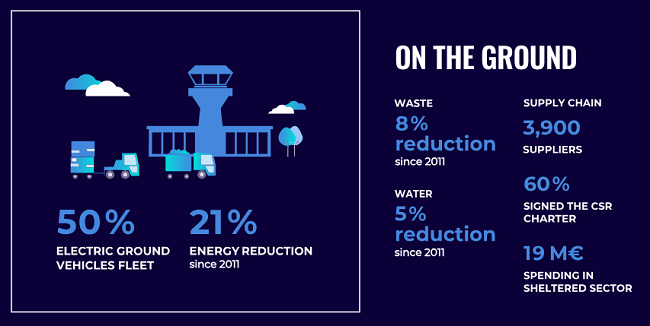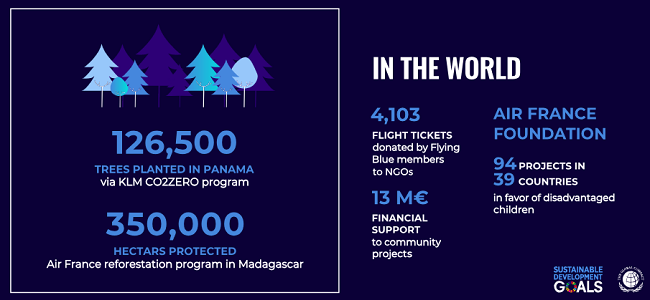The sustainability of KLM speaks for itself.
Through innovation and responsible choices, KLM is accepting its duty to society while making a valuable contribution. KLM maintains a constant dialogue with stakeholders at a variety of levels and in a regional, national and international context.
KLM sees the Sustainable Development Goals (SDGs) as a guide to develop its own sustainability policy. The 17 goals set by the United Nations provide a direction for sustainable growth and investment, while paying attention to human rights, economic growth, peace and security and climate problems.
KLM’s sustainability focuses mainly on those objectives in which it can exert greater influence, such as «Decent work and economic growth» (8), «Responsible consumption and production» (12) and «Climate action» (13).
Jean-Marc Janaillac, President and CEO of Air France – KLM said about KLM’s sustainability:
«Integrate corporate social responsibility more intensively in our operations, create a dynamic of progress with all our staff and find original solutions in all our sectors, are the objectives that will allow us to rethink our activity.»
15 actions: the sustainability of KLM
KLM has a very clear focus when it comes to sustainability. Their actions are divided into 3 areas:
- In the air
- On the ground
- In the world
The sustainability of KLM in the air
1. 16% reduction of CO2 emissions per passenger compared to 2011. Forecast for 2020: 20% reduction
A major contribution when it comes to KLM’s sustainability will come from fleet renewal to reduce emissions and improve fuel efficiency. What has been done?
- Reduce the total weight of aircraft
- Optimize the use of the airspace and
- Train pilots to apply the most fuel efficient procedures.
In the midterm, sustainable biojet fuel could make a substantial contribution (reducing CO2 emissions by up to 80% compared to fossil fuel).
In the meantime, KLM offers carbon neutral flying by way of our carbon offsetting program CO2ZERO. In addition, KLM takes part in the EU Emissions Trading System (ETS) that secures a cap for carbon emissions for all flights within Europe.
2. 40% noise reduction achieved due to fleet renewal
Benefits of fleet renewal include
- Fuel efficiency
- Less noise and
- Lower carbon emissions.
The Boeing 787-9 Dreamliner emits up to 40% less noise than comparable aircraft. Noise reduction is achieved by various innovations in for example the design of the aircraft engines. This reduces noise to 85 decibels in the airport boundaries, which is approximately the noise level of busy road traffic.
3. 360,000 kg less weight and onboard waste by replacing newspapers for the KLM Media App
KLM’s sustainability has to do with reducing the number of paper newspapers on board which results in 360,000 kg reduction in weight and onboard waste. Annually this will save KLM 229,000 liters of kerosene and cut CO2 emissions by 577 tones.
4. 561 flights partly performed with sustainable biojet fuel
For a period of three years (until 2018), KLM will operate all its flights from Los Angeles to Amsterdam partly with sustainable biojet fuel. In 2017, 561 flights were operated from Los Angeles.
- Currently, KLM is the only European airline that operates intercontinental flights that are partly powered by sustainable biojet fuel.
- Up to 2017, KLM operated about 1,200 flights in part using sustainable biojet fuel.
- In 2011 KLM was the first airline to ever operate a commercial flight with sustainable biojet fuel.
- The sustainable biojet fuel (used cooking oil) is supplied by AltAir, the only refinery that offers a continuous production of sustainable aviation fuel.
- Biojet fuel can reduce the CO2 emission by up to 80%.
- KLM only uses sustainable biojet fuels that have been produced from raw materials that do not have a negative impact on biodiversity and/or food production.
5. 100% UTZ certified coffee on board
KLM’s sustainability would not be the same without including responsible supplies in food and drinks offered in the air.
- KLM has the ambition to take care of a responsible catering experience, by making product choices with integrity by
- Choosing products and partners that share its sustainable mission, in order to contribute to the global ambition of reaching the Sustainable Development Goals.
- Its catering policy is applied to all flights departing from Amsterdam Airport Schiphol.
- The fish KLM serves either has the MSC or ASC certificate, or is certified by the green list of the WWF’s Seafood Guide.
- KLM serves UTZ certified coffee to all passengers in all travel classes.
- They serve sustainable certified chocolate to passengers in all travel classes.
- KLM was the first European airline to eradicate mass-produced chicken and egg products from its catering.
- KL M exclusively uses animal welfare certified eggs and egg products on board all flights departing from Amsterdam.
KLM’s sustainability on the ground
6. 8 million liters of water saved due to the semi-dry wash of aircraft
One aspect of sustainable operations is the responsible management of water. To wash the aircraft itself, a method that is known as ‘semi-dry wash’ is used. This procedure requires 80 times less water per wash.
7. 17% reduction of CO2 emissions in ground operations. Forecast for 2020: 20% reduction
KLM aims to reduce its CO2 emissions from ground operations by 20% in 2020 compared to 2011. This reduction will be achieved through reducing electricity, gas and fuel use. By the end of 2017 KLM has reduced CO2 emission from ground operations by 17% compared to 2011. Further electrification of KLM’s ground handling equipment at Schiphol is amongst the focus areas. By the end of 2019, KLM will have replaced 75% of all our ground support equipment with electric alternatives.
8. 12 new quieter, cleaner and more efficient aircraft added to the fleet
The main benefits of fleet renewal include
- Fuel efficiency
- Noise and emission reduction
- Load capacity and
- Total cost of ownership in the end-of-use stage.
The reduced fuel consumption of new aircraft types in KLM’s fleet is not only determined by the aircraft itself, but is optimized by KLM´s efforts to improve operational efficiency. This includes reducing aircraft weight by using lighter equipment on board, improved use of airspace and optimal flight procedures to deal with weather conditions and fuel consumption. In 2017, KLM added 2 Boeing 787-900 Dreamliners, 2 Boeing 777-300s and 8 Embraer 175+ aircraft to the fleet. But the sustainability of KLM does not stop there.
9. 1,000 interns joined KLM
It is KLM’s responsibility and a business necessity – if you want to innovate – to give new generations an opportunity to develop and to bring new and up-to-date knowledge into the company. There are different opportunities at various departments in the organization. Additionally, KLM has a program for management trainees: KLM Corporate Management Traineeship/Management Traineeship Business & IT.
10. 32% less residual waste per passenger since 2011
In 2012, as part of KLM’s sustainability they launched its ambition to reduce residual waste by 50% in 2050 (compared to 2011). This will be achieved by reducing the total volume of waste and increasing the percentage recycled.
In 2017, residual waste was reduced by 12%, while 24% was recycled. Due to the proactive waste policy in the Netherlands, none of KLM’s non-hazardous waste ends up in landfill; all of it is recycled or recovered. At KLM 14 different waste streams are collected separately throughout our operations and send for recycling. This includes paper, metal, glass, plastic, wood, clothing, electronic appliances and more.
KLM’s sustainability in the world
11. Listed 13 times at the top of the Dow Jones Sustainability Index as Air France-KLM Group
Air France and KLM have a commitment to act sustainably, are committed to the UN Global compact principles and aim to contribute to the UN Sustainable Development Goals. KLM has been at the top end of the Dow Jones Sustainability Index in the Airline category for 13 consecutive years.
12. 60,000 passengers travelled carbon neutral with KLM’s CO2ZERO compensation service
KLM’s CO2ZERO service enables passengers to offset their flight-related carbon emissions, which neutralizes their carbon footprint deriving from their flight. KLM calculates the actual CO2 emissions of the flight, based upon the type of aircraft, the distance flown, and the historical load factor. One out of 535 passengers travelled carbon neutral with CO2ZERO in 2017. This is an increase of 50% in 2017 relative to 2016.
The compensation passengers pay via CO2ZERO is invested in Gold Standard carbon credits. A carbon credit is an approval for greenhouse gas emissions reduced or removed from the atmosphere through a project that reduces emissions. All Gold Standard credits for Global Goals projects have to contribute to at least two UN Sustainable Development Goals (SDGs), not only by having a positive impact on the climate, but also by benefitting local communities as much as possible.
13. 1,641 flights taken by NGO partners through donated Flying Blue Miles
Flying Blue members can choose to donate Award Miles to charities that need to fly to project locations to reach their goals such as WWF, UNICEF and the Red Cross, but also to innovators like the Ocean Clean Up.
14. 126,500 trees planted in mixed tropical forests in Panama via KLM CO2ZERO
With its CO2ZERO compensation service, KLM offers passengers the opportunity to fly CO2 neutral. In doing so, they contribute to KLM’s CO2ZERO project, a reforestation initiative in Panama named CO2OL Tropical Mix.
This project carries the Gold Standard for the Global Goals certificate. This project transforms former pastures into new mixed forests and maintains them. A reforestation project work as follows: newly planted trees absorb carbon dioxide emissions (CO2) from the atmosphere and store (sequester) them in their roots, stem and crown.
Besides having a positive environmental impact, the project will also create jobs, generating a fixed income and good working conditions for 150 people. It will also offer its employees a basic education and training in sustainability and ecological alternatives. This will enable local workers to improve their living conditions, skills and knowledge.
In October 2017, the reforestation project replaced the Toyola Coalpot project in Ghana, which also has a Gold Standard certificate.
15. 25,579 children supported by Wings of Support
Wings of Support is an NGO established by KLM employees in 1998. It is an independent organization run by about 90 KLM volunteers. Its purpose is to help children in countries that KLM serves, by facilitating education, shelter and medical care. The aim is to involve the local population in projects.
Every day, Air France-KLM innovates to reduce its environmental impact, offers responsible products and services, increases the motivation and professionalism of its employees and contributes to local development. The Group is remarkably committed to fulfilling these actions and the integration of the circular economy principles in its operations and the development of sustainable alternative fuels for the airline industry.
What do you think of these 15 actions as part of KLM’s sustainability? Please, leave a comment.














